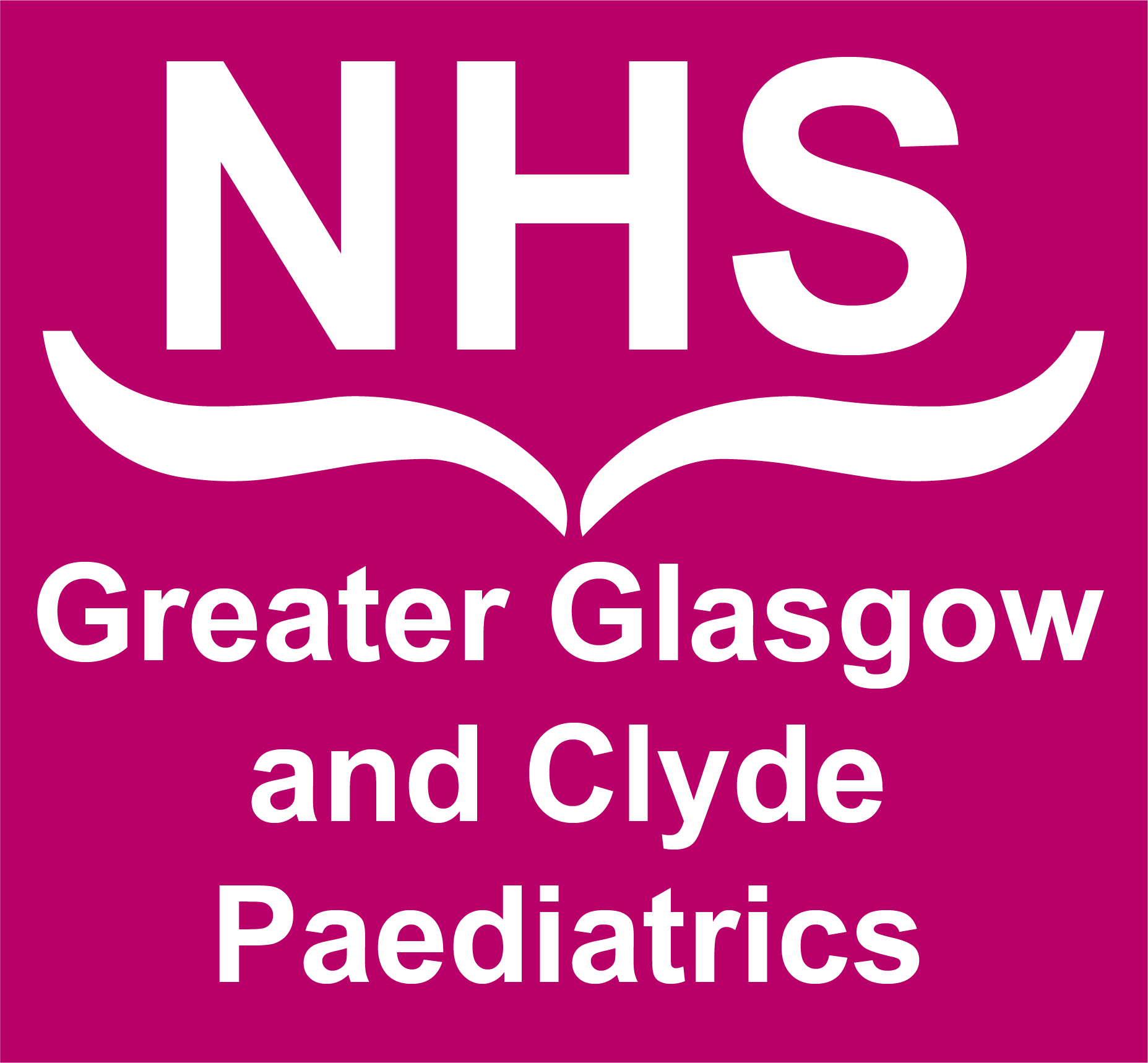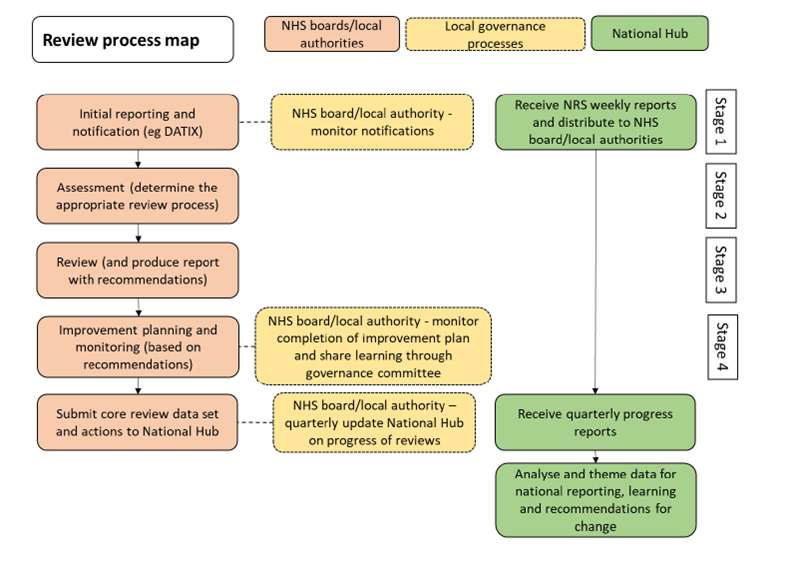- After a death happens the death registration process is followed.
- The death notification is received by the child’s resident NHS board.
- The NHSGGC CDR team contacts relevant staff from health and social care who were involved in the care of the child.
- Staff will be asked to fill in paperwork called a ‘CDR Questionnaire.’
- The CDR team will contact the family to inform them of the CDR process and offer them an invitation to meet. This will give the family the opportunity to ask any questions they have around the care that their child received. A key worker will be allocated to each family who will support them through the process.
- The NHSGGC CDR team will refer the family to Child Bereavement UK.
- Once all the CDR Questionnaires are returned, it is then reviewed by the NHSGGC CDR team.
- The NHSGGC CDR team will organise a multi-agency child death review once the final post mortem has been released by the procurator fiscal if one has been carried out.
- The chair of the review will introduce the purpose of the meeting. There might also be other groups present depending on circumstances. For example, a review into the death of a baby might include the health visitor and hospital staff, while death of a young person might include a school representative. We will try to identify together examples of good practice as well as honestly and openly look for learning which may improve future practice. We will discuss the support and communication we have had with the child or young person’s family following their death.
- The family’s questions will also be discussed, and we will share our responses with them and offer support going forward.
- All this information is entered onto a ‘Core Dataset’ which will be shared at the review.
- After the meeting, everyone will have a chance to review it before it is submitted to key groups for approval.
- Once this is approved, the NHSGGC CDR team uploads it to a Scottish Government portal. Other health boards will also have to do this too for deaths that occur in their area. This ensures that there is a national system in place for consistent reviewing of deaths.
- The outcome of the review is fed back to the family.
- If learning is identified from the reviews, then improvement and monitoring are taken on board by the relevant teams.
- It may take up to 1 year or more to gather all the relevant information and reports for the CDR Review.
Child Death Review procedures, RHC

Objectives
- The Child Death Review (CDR) process was launched on the 1st October 2021 by the Scottish Government.
- The Scottish Government has a specific age criterion for review. All deaths from 22 week’s gestation to the date of their 18th birthday, or 26th birthday for people who have been in care should have a review carried out. This is a mandatory requirement.
- NHS Greater Glasgow & Clyde (NHSGGC) and other Scottish health boards are working closely with an organisation called the National Hub to achieve the following aims:
- to make sure that every death that meets the criteria undergoes a quality review
- to improve the experiences for bereaved families and carers
- to make sure that the learning points from the reviews are shared across the Health Board and Social Care partners
What is the purpose of the Child Death Review?
The purpose is to make sure that every child death is reviewed by a team of local professionals to explore events in more detail and to discuss the care provided to the child and their family. The NHS Greater Glasgow & Clyde CDR team will help coordinate and advise on the process.
I know that NHSGGC has internal death reviews that are carried in similar ways. Is CDR the same thing?
The CDR share common features with existing reviews and the CDR team will liaise with them to get a document completed at the end of their process. Existing reviews only review patients who meet their own specific criteria. The CDR is a new review process that will also review deaths that are not routinely reviewed by existing reviews.
Who is in the CDR team?
The NHSGGC CDR Team consists of consultant clinical leads for Neonates, SUDI, Child Death (0-16 years) and young person’s (16-26years) and our Administration Team
Why have I been invited to the Review?
A child or young person known to you or your service has recently died. There is to be a review of the child or young person’s death and you have been invited to join this to contribute to the discussions
What questions will be discussed at the Review?
Participating in a Review can be highly stressful and it is understandable if you feel unsettled or anxious. If you are worried, then please contact the CDR team on ggc.cdr@ggc.scot.nhs.uk whom will put you in touch with one of our Clinical Leads or Co-ordinators to talk to you about any concerns that you may have and guide you on what to expect.
Can my line manager or Clinical Supervisor join me at the meeting?
You are welcome to invite your line manager or clinical supervisor. Please let the CDR team know on ggc.cdr@ggc.scot.nhs.uk.
A Child Death Review is not a complaints process.
Some families and carers might see the Child Death Review as a means of answering their questions and addressing their complaints. These should be made through the usual channels and not wait for the outcome of the review. We will be working with grieving families and carers to address this.
The email is also asking me to complete a CDR Questionnaire. What is this?
The CDR Questionnaire has been designed to obtain information that is required by the Scottish Government and also inform the review. All professionals involved in the child’s care will be asked to complete this in advance of the CDR Review meeting
I am unable to answer all the questions on the CDR Questionnaire. What do I do?
The CDR Questionnaire has an option to select ‘0 – information not available’ as a response. The CDR team has made sure to include staff from a wide range of relevant departments to the review so it may well be that they could provide information to the questions that you are unable to answer.
Are the reviews face to face or on MS Teams?
At the moment, and for the foreseeable future, all the reviews are being held online using Microsoft Teams. You will be sent a link so you can join the review.
What can I do to prepare myself for the review?
Take some time to read through your records of your contact with the child / young person. It can sometimes be months between when the child or young person has died and the review so you may need to refresh your memory.
Do I need to prepare a report or chronology before I come to the review?
No this isn’t a requirement. You will be invited to tell the review group about your role with the child /young person who died and participate in the discussion. Some people find that it helps to have some notes to refer to during the review.
The Scottish Government through the commissioning of the National Hub for reviewing and learning from the deaths of children and young people (co-hosted by Healthcare Improvement Scotland and the Care Inspectorate) require us to standardise the way in which we review, record and report all children within NHSGGC aged 0 – 18 (or up to aged 26 if in receipt of ongoing care or aftercare in local authority care) who have died. This information will feed into the national child mortality database owned by the National Hub.
The outcome of all information is expected to be the identification of modifiable or preventable factors in the deaths of children. This work will be undertaken in collaboration between NHS Boards; Local authorities (including HSCP), Healthcare Improvement Scotland and the Care Inspectorate.
A team has been established within hospital paediatrics consisting of clinical and administration representatives to establish and maintain the service.
This SOP suggests a process for managing reviews.
Child Death Review Reporting Procedure SOP (last updated December 2023)

